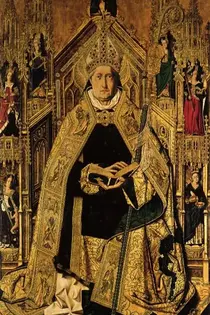The Catholic Defender: Saint Caesar de Bus
- Donald Hartley

- Apr 15
- 3 min read
Updated: Apr 16
Deepertruth with special permission and aid with Franiciscan Media, a great team for the Lord

Like so many of us, Caesar de Bus struggled with the decision about what to do with his life. After completing his Jesuit education he had difficulty settling between a military and a literary career. He wrote some plays but ultimately settled for life in the army and at court.
At eighteen he joined the king's army and took part in the war against the Huguenots
For a time, life was going rather smoothly for the engaging, well-to-do young Frenchman. He was confident he had made the right choice. That was until he saw firsthand the realities of battle, including the Saint Bartholomew’s Day massacres of French Protestants in 1572.
He distinguished himself by his works of charity and his zeal in preaching and catechizing and conceived the idea of instituting a congregation of priests who should devote themselves to the preaching of Christian doctrine. In 1592
known as Christian Doctrine Fathers, were founded in the Swiss town of L'Isle and in the following year came to Avignon, France. This institute's development into a religious congregation was approved by Pope Clement VIII on 23 December 1597. Besides the Christian Doctrine Fathers, de Bus founded a congregation for women originally called "Daughters of Christian Doctrine", which later came to be called the "Ursulines", which died out in the 17th century.
He fell seriously ill and found himself reviewing his priorities, including his spiritual life. By the time he had recovered, Caesar had resolved to become a priest. Following his ordination in 1582, he undertook special pastoral work: teaching the catechism to ordinary people living in neglected, rural, out-of-the-way places. His efforts were badly needed and well received.

Working with his cousin, Caesar developed a program of family catechesis. The goal—to ward off heresy among the people—met the approval of local bishops. Out of these efforts grew a new religious congregation: the Fathers of Christian Doctrine.
“Family catechesis” is a familiar term in parish life today. Grounded in the certainty that children learn their faith first from their parents, programs that deepen parental involvement in religious education multiply everywhere. There were no such programs in Caesar’s day until he saw a need and created them. Other needs abound in our parishes, and it’s up to us to respond by finding ways to fill them or by joining in already established efforts.
Pope Pius VII declared César de Bus venerable in 1821 and Pope Paul VI beatified him in Rome on 27 April 1975. On 27 May 2020 Pope Francis issued a decree via the Congregation for the Causes of Saints approving a miracle and hence clearing the way for de Bus to be proclaimed a saint; he was canonized on 15 May 2022. During his life Saint César de Bus demonstrated his love for two things especially – the catechism and those on the outer reaches of society. Through his example, he reminds us to go out to the peripheries, to the marginalized, as Pope Francis so often calls us to do.
Pope Pius VII declared César de Bus venerable in 1821 and Pope Paul VI beatified him in Rome on 27 April 1975. On 27 May 2020 Pope Francis issued a decree via the Congregation for the Causes of Saints approving a miracle and hence clearing the way for de Bus to be proclaimed a saint; he was canonized on 15 May 2022.
The miracle that allowed the canonization was the grace granted to a 25 year old girl, hospitalized in Salerno for a cerebral hemorrhage who was diagnosed with fulminant meningitis.
In Salerno, we have a community where there is a parish and we also have our own doctrinal editions for catechesis. A prayer chain was really created. Both in the hospital, together with relatives, and in church, every night they prayed, asking for healing through the intercession of Blessed César. And well, from one moment to another, overnight, the whole situation was resolved, and the girl woke up, immediately asking to smoke. She was a person who liked to smoke a lot and she was recovered, especially from the point of view of meningitis. It did not leave any serious damage like the doctors thought, considering the clinical situation.





















Comments